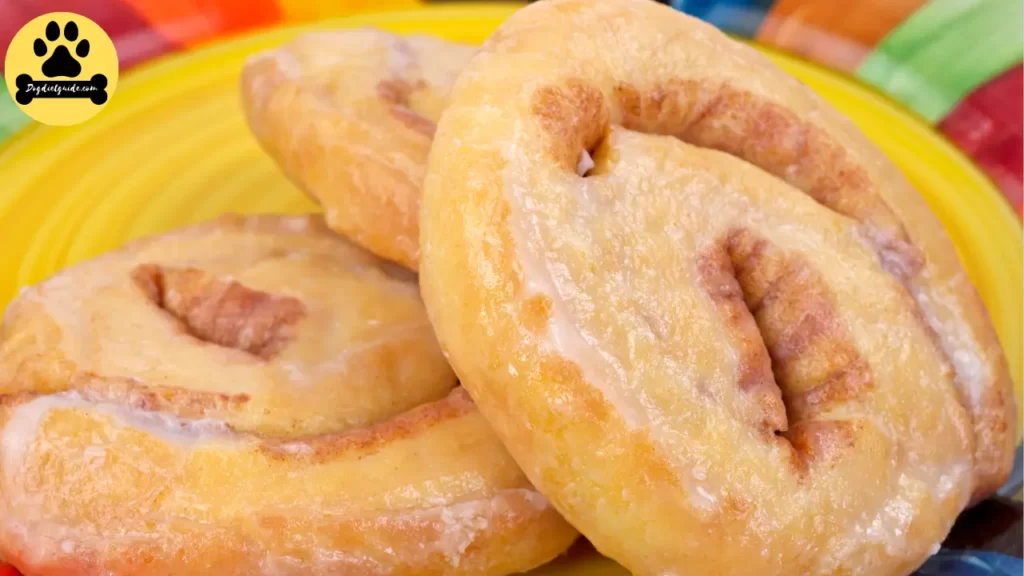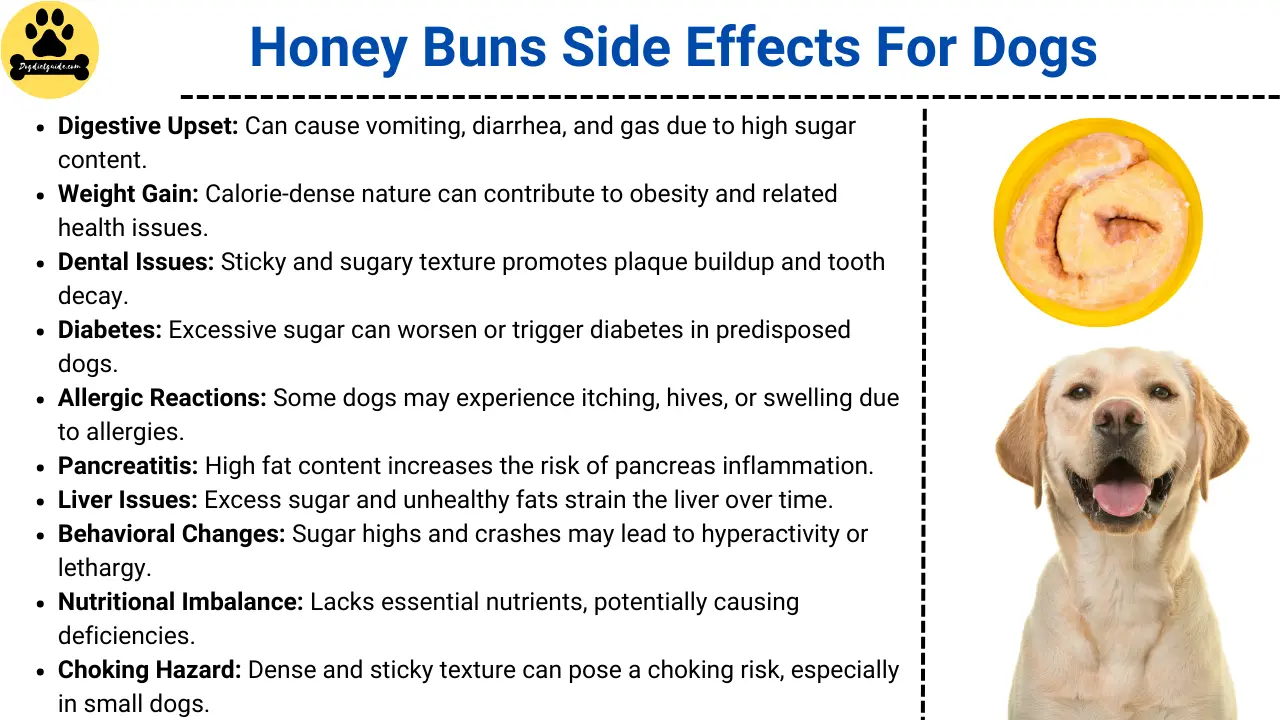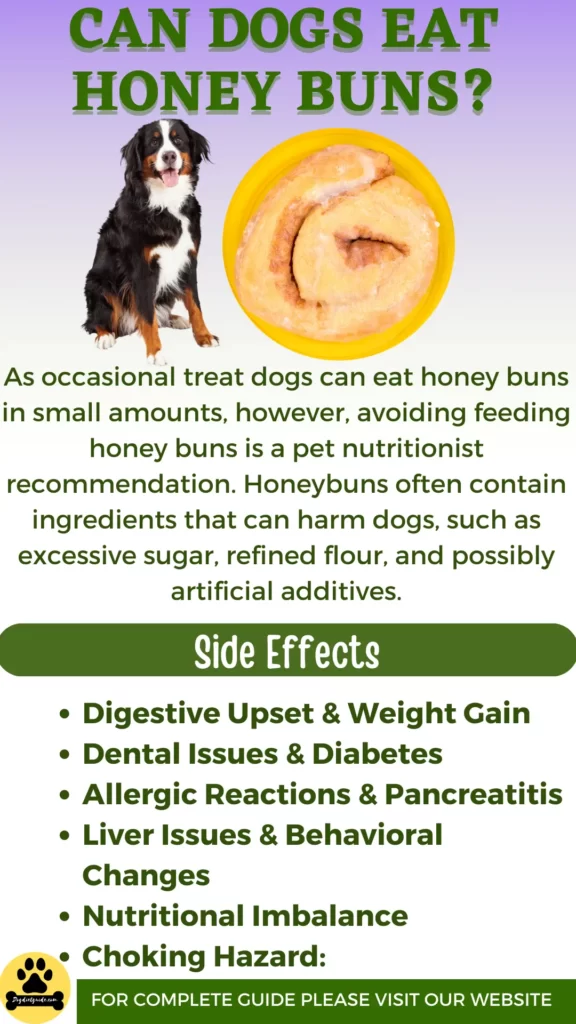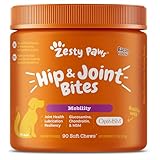Honeybuns are a favorite indulgence for many of us with their tempting sweetness and delightful aroma. But as a responsible dog owner, you might wonder whether this scrumptious treat is safe for your furry friend. Can dogs have honey buns?
Can Dogs Eat Honey Buns? As an occasional treat, dogs can eat honey buns in small amounts. However, avoiding feeding honey buns is a pet nutritionist’s recommendation. Honeybuns often contain ingredients that can harm dogs, such as excessive sugar, refined flour, and possibly artificial additives.
Canine Diet and Digestive System
Before we dive into the specifics of honey buns, let’s take a moment to understand the basics of a dog’s diet and digestive system.
Dogs are omnivores, meaning they can consume animal- and plant-based foods. However, their digestive systems differ from humans, and certain foods that are safe for us might not suit our four-legged friends.
Can Dogs Eat Honey Buns?
Dogs can consume small amounts of honeybuns without any toxic effects. However, it is advisable to avoid feeding them honey buns. Honeybuns often contain detrimental components like excessive sugar, refined flour, and potentially artificial additives, which can adversely affect dogs. These ingredients may result in digestive disturbances, obesity, and other canine health concerns.
Sticking to a balanced and appropriate diet for your furry friend is always best. If you want to treat your puppy sweet, consider offering them a small amount of plain, raw honey in moderation.
However, you should consult your veterinarian before introducing new foods into your dog’s diet to ensure their safety and well-being.
Ingredients of Honey Buns: To determine whether honey buns are safe for dogs, examining their ingredients is crucial. Honeybuns typically contain refined flour, sugar, vegetable oil, and artificial additives.
These treats’ high sugar and fat content can pose potential risks to your dog’s health.

Why Can’t Dogs Have Honeybuns?
The Impact of Sugar and Artificial Additives
Canines possess a restricted capacity to metabolize sugar, and indulging in excess can trigger problems such as obesity, dental complications, and even diabetes.
Artificial additives such as preservatives and colorants have the potential to induce digestive disturbances and provoke allergic reactions in certain dogs.
Xylitol A Hidden Danger
Can dogs have honey buns? One ingredient in some honey buns that severely threatens dogs is xylitol. Xylitol is a sugar substitute commonly employed in baked goods.
However, it poses a grave danger to canines as it can trigger a swift insulin release, leading to hypoglycemia or low blood sugar levels. Ingesting xylitol can be fatal for dogs, even in small amounts.
Effects of Refined Flour
The refined flour used in honey buns lacks essential nutrients and fiber, offering little to no nutritional value for puppies.
Moreover, it can contribute to digestive issues and spikes in blood sugar levels.
Potential Allergies & Sensitivities
Canines, like humans, can have food allergies and sensitivities. Wheat, commonly found in honey buns, is a common allergen for some dogs.
Feeding your furry friend foods to which they are allergic can lead to skin problems, gastrointestinal distress, and discomfort.
Honey Buns Side Effects For Dogs
-
Digestive Upset: Can cause vomiting, diarrhea, and gas due to high sugar content.
-
Weight Gain: Calorie-dense nature can contribute to obesity and related health issues.
-
Dental Issues: Sticky and sugary texture promotes plaque buildup and tooth decay.
-
Diabetes: Excessive sugar can worsen or trigger diabetes in predisposed dogs.
-
Allergic Reactions: Some dogs may experience itching, hives, or swelling due to allergies.
-
Pancreatitis: High fat content increases the risk of pancreas inflammation.
-
Liver Issues: Excess sugar and unhealthy fats strain the liver over time.
-
Behavioral Changes: Sugar highs and crashes may lead to hyperactivity or lethargy.
-
Nutritional Imbalance: Lacks essential nutrients, potentially causing deficiencies.
-
Choking Hazard: Dense and sticky texture can pose a choking risk, especially in small dogs.

How To Give Honey Buns To Dogs?
Are honey buns safe for dogs? While honey buns contain ingredients generally unsuitable for dogs, the occasional tiny nibble might not cause immediate harm. However, it’s essential to emphasize that moderation is crucial.
A small taste of honey bun on rare occasions is a different scenario than allowing your dog to indulge in the entire treat.
Healthier Treat Alternatives
Instead of sharing sugary treats with your pet, consider offering healthier and safer alternatives.
Natural treats like small apple pieces, carrot sticks, or even a spoonful of plain, unsweetened yogurt can provide a more nutritious and dog-friendly option.
Read More:
FAQs
Can dogs eat buns?
Dogs can occasionally consume plain buns in small quantities, but it’s not ideal for them. The high carbohydrate content might lead to weight gain or upset stomachs.
Some buns contain ingredients like garlic or onion, which are toxic to dogs. If sharing, ensure the bun is plain, fully cooked, and doesn’t contain harmful additives.
Can honey buns kill dogs?
Honey buns are not an immediate threat but aren’t recommended for dogs. While a small amount might not be lethal, these treats are often high in sugar, unhealthy fats, and additives. Over time, excessive consumption can contribute to obesity, diabetes, or other health issues.
Are honey buns good for dogs?
Honey buns are not a beneficial food for dogs. They are typically laden with sugars, unhealthy fats, and artificial additives. These components can lead to weight gain, digestive problems, and potential long-term health issues.
Can dogs eat honey bread?
Plain, homemade honey bread in small quantities occasionally is unlikely to harm most dogs.
Final Thoughts: Can Dogs Eat Honey Buns?
While sharing a honey bun with your dog might be tempting, it’s best to avoid feeding these sugary treats to your canine companion.
The high sugar, fat, and artificial additive content, coupled with the potential danger of xylitol, make honey buns an unsuitable choice for dogs. Prioritizing your dog’s health and well-being is paramount.
Choose healthier treatment options and seek advice from your veterinarian to ensure your furry companion maintains a well-balanced and nourishing diet.

Resources:
https://www.petmd.com/dog/nutrition/can-dogs-eat-sugar
https://www.countrygrovevet.ca/2022/03/22/why-human-food-shouldnt-be-dog-food/
https://www.aspca.org/pet-care/animal-poison-control/people-foods-avoid-feeding-your-pets










![Can Dogs Eat Blood? 7 Side Effects [Expert Opinion]](https://petskor.com/wp-content/uploads/2022/04/Webp.net-resizeimage-12.jpg)
